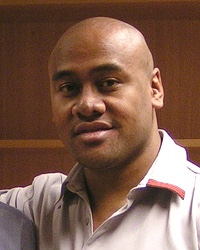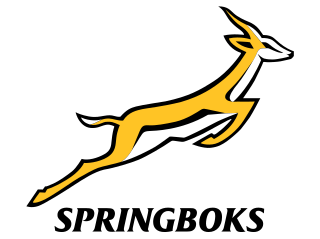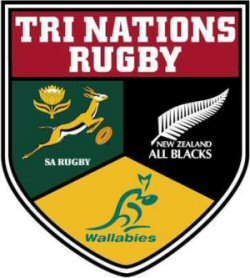
The New Zealand national rugby union team, commonly known as the All Blacks, represents New Zealand in men's international rugby union, which is considered the country's national sport. Famed for their international success, the All Blacks have often been regarded as one of the most successful sports teams in history.

The Rugby Championship, formerly known as the Tri Nations Series (1996–2011), is an international rugby union competition contested annually by Argentina, Australia, New Zealand, and South Africa. These are traditionally the four highest ranked national teams in the Southern Hemisphere; the Six Nations is a similar tournament in the Northern Hemisphere.

Jonah Tali Lomu was a New Zealand professional rugby union player. He is widely regarded as one of the greatest and most influential players in the history of the sport, and as one of the most talented sportsmen ever. Lomu is considered to have been the first true global superstar of rugby, and consequently had a huge impact on the game.

The South Africa national rugby union team, commonly known as the Springboks, is the country's national team governed by the South African Rugby Union. The Springboks play in green and gold jerseys with white shorts, and their emblem is the Springbok, a native antelope and the national animal of South Africa. The team has represented South African Rugby Union in international rugby union since 30 July 1891, when they played their first test match against a British Isles touring team. Currently, the Springboks are the reigning World Champions, having won the World Cup a record four times. South Africa have won half of the Rugby World Cups they have participated in and are also the second nation to win the World Cup consecutively.

The Australia men's national rugby union team, nicknamed the Wallabies, is the representative men's national team in the sport of rugby union for the nation of Australia. The team first played at Sydney in 1899, winning their first test match against the touring British Isles team.
The Rugby League Tri-Nations was a rugby league tournament involving the top three teams in the sport: Australia, Great Britain and New Zealand and is the predecessor of today's Rugby League Four Nations.

The Samoa national rugby union team represents the Samoa Rugby Union in men's international rugby union. They are also known as "Manu Samoa", which is thought to derive from the name of a Samoan warrior. They perform a traditional Samoan challenge called the siva tau before each game. Samoa Rugby Union were formerly members of the Pacific Islands Rugby Alliance (PIRA) along with Fiji and Tonga. They are ranked 11th in the world.

Bryan Gary Habana OIS is a South African former professional rugby union player. Playing mainly as a wing, he is widely considered to be one of the greatest players in the history of the sport. He played for the Golden Lions, the Blue Bulls and Western Province in South Africa, for the Bulls and the Stormers in Super Rugby, and for Toulon in the French Top 14, and won 124 caps for the South Africa national team.
The 2004 Tri Nations Series, an annual rugby union competition between the national teams of Australia, New Zealand and South Africa, was the ninth in the series. The competition is organised by SANZAR, a consortium of the three countries' rugby union federations. The series was contested in its original double round-robin format, with each team playing the others twice.
The 2003 Tri Nations Series was contested from 12 July to 16 August between the national rugby union teams of Australia, New Zealand and South Africa. New Zealand won the tournament for the fifth time.
The 2002 Tri Nations Series was contested from 13 July to 17 August between the Australia, New Zealand and South Africa national rugby union teams. The All Blacks won the tournament.
The 2001 Tri Nations Series was contested from 21 July to 1 September between the Australia, New Zealand and South Africa national rugby union teams. The Wallabies won another thrilling game at Stadium Australia in Sydney with number eight Toutai Kefu scoring a try at the death in captain John Eales' final test match, to successfully defend the Tri Nations trophy.
The 1996 Tri Nations Series was the inaugural Tri Nations Series, a rugby union competition contested by the men's national teams of Australia, New Zealand and South Africa. It was contested from 6 July to 10 August. New Zealand won all four of their matches to claim the title, as well as retaining the Bledisloe Cup won the previous year for their two wins over Australia.
The 1997 Tri Nations Series was the second Tri Nations Series, an international rugby union competition contested by the men's national teams from Australia, New Zealand and South Africa. It was played from 19 July to 23 August, with each team playing each of the others twice – once at home and once away. New Zealand won all four of their matches to claim a second straight title.
The 1998 Tri Nations Series was contested from 11 July to 22 August between the Australia, New Zealand and South Africa national rugby union teams. The Springboks won the tournament.

Tri Nations Series champion is the title given to the rugby union nation that finishes at the top of competition table of the annual Tri Nations Series. The Bledisloe Cup, an Australian-New Zealand trophy is also awarded within the series.
New Zealand and South Africa have been playing Test Match Rugby against each other since 1921 when the All Blacks beat the Springboks in Dunedin 13–5. It is argued to be the biggest rivalry in World Rugby history. There is considerable history behind these matches, much of it off the field. In 1981, there were numerous protests in New Zealand over the Springboks coming to tour New Zealand due to the then South African government's policy of Apartheid. Consequently, subsequent tours were cancelled and the All Blacks and Springboks did not meet again until August 1992, in Johannesburg, when the Springboks were re-admitted to World Rugby. Until 1996 New Zealand had never won a series in South Africa but South Africa had won a series in New Zealand in 1937. The rivalry was close for eighty years between 1921-2000, when New Zealand led the head-to-head by 27-26. In the first 17 years of the 21st century, New Zealand compiled a 31-10 record over South Africa, but the appointment of Rassie Erasmus as coach of the Springboks in 2018 resulted in the rivalry reigniting, as South Africa lead the series 7-5 since his appointment.

The 2009 Tri Nations Series was the fourteenth annual Tri Nations rugby union series between the national rugby union teams of New Zealand, Australia and South Africa, respectively nicknamed the All Blacks, Wallabies, and Springboks. The Springboks secured the season crown in their final match on 12 September, defeating the defending series champion All Blacks 32–29 in Hamilton.

The first clash in Rugby Union between Australia and New Zealand took place in a test match on 15 August 1903 in Sydney, New South Wales. On that occasion, New Zealand won 22–3.










